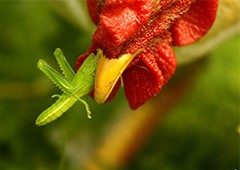Growing organic vegetables is a wonderful way to “Go green”! The principles of organic gardening are based on simple respect for the soil. By enriching and creating an equilibrium of life within that soil you build a strong foundation to grow healthier more nutrient rich vegetables and herbs. Organic gardening is not a new phenomenon, but it is a growing one! So, what does “organic” mean and how do you grow organic vegetables?
Organic Vegetables Are...
Organic simply means gardening without the use of artificial or synthetic fertilizers or pesticides, consequently, organic vegetables are grown by feeding the soil with organic matter or products, while controlling the pest population naturally.

A Great Foundation Grows Great Organic Vegetables!
Everything in life is as strong as its foundation-houses built on a strong foundation last for centuries and earn historic pride, children grow up healthy because they eat a well- balanced diet and gardens reap healthier chemical-free organic vegetables when living in strong fertile soil! The organic gardening philosophy shares that by feeding and tending the soil, there is minimal, if any, need for applying fertilizer to your precious organic vegetables above ground.
Abundant life abounds in healthy garden soil-wonderful tiny microorganisms such as fungi, algae, mites, nematodes and bacteria thrive and interact-in fact, the more microorganisms, the merrier you will be when you harvest vibrant, nutrient rich organic vegetables.
To create a strong soil foundation for your organic vegetables, simply add organic matter and mix. Simple recipe for simple success! The folks here at Backyard Chicken Coops just want to give you a little hint...chickens! Yes, chickens will help you add nutritionally rich organic matter to your vegetable garden via their delightful droppings! Chicken manure is rich in plant lovin’ nitrogen, phosphorous, and potassium! Actually, any type of manure will add great organic matter to your soil, we just happen to LOVE chickens!
Creating a varied compost heap and mixing compost into your soil in spring, prior to planting and again in autumn,following harvest, adds abundant organic matter for growing abundant organic vegetables! Other easy to find sources of organic matter are rotting leaves and wood ash.Choose Seeds and Plants Wisely!
The best way to grow your own organic vegetables is to start from scratch! Only then you’ll have peace in the knowledge that your harvest is 100% organic. Organic seeds and plants are everywhere! Perhaps your seeds are just around the corner-sharing or trading your organic vegetables’ seeds with family and friends is a great way to get started or to spread the wealth, so to speak.
Do you dig digging? Well, then warm up that green thumb and get an early start by starting your own seeds! Starting seeds indoors in spring under your watchful eyes gives them a strong foundation!
Organic Vegetables Thrive with Favorable Fertilizer!

The beauty of organic fertilizers is twofold-they nourish both underground and above ground! While chemically based fertilizers do feed plants, over time they cause the working class micro-organisms in the soil to pack their bags and leave. Chemical fertilizers add acid to the soil which chases away earthworms and other living organic matter, thus weakening the foundation!
Favourable organically based fertilizers strengthen the foundation and are created from natural plant and animal material, as well as, minerals from rocks. Your organic vegetables will applaud you when you offer them healthy snacks 24/7 by feeding your soil with the following:
Organic Plant Fertilizers: alfalfa and crimson clover (chop up plants prior to blooms forming and mix into soil) alfalfa meal, cottonseed meal, corn gluten meal, and liquid or dry kelp.
Organic Animal Fertilizers: bone and blood meal, fish emulsion and bat and bird excrement
Organic Mineral Fertilizers: Chilean nitrate, rock phosphate, greens and sulfate of potash magnesia.
Organic fertilizers are readily available at your local garden center or online. They come pre-mixed for convenience or ingredients are sold individually. This is a big plus, because it allows the gardener to tailor make their own concoction. So, mix up a peaceful potion for specific organic vegetables or the whole garden plot.
Pest Control, Naturally!
Gardening attracts pests! It’s just an unfortunate fact of life. So, don’t be bugged by buggy bounty lovin’ bugs! Arm yourself with natural defenses and you can conquer the war on insect pests without subjecting your precious organic vegetables to harmful substances.
Homemade concoctions abound and typically incorporate handy ingredients. Something as simple as soap can rid your pretty plants of a wide variety of pests! Simply mix 15 ml of ordinary dishwashing liquid with 4 litres of water and spray away the pests! Garlic, hot pepper sauce, and the anti-slug slugger, beer, are other common ingredients. Gotta have your morning coffee? Be bug spray savvy- save some of your brew and spray on trespassing snails! The best homemade organic bug concoctions are only a short google session away for pest free organic vegetables!
Other plants can also be your ally in the war against pests. Nifty Nasturtiums are the jack of all beneficial plants-Nasturtiums not only repel mites and aphids, but also attract helpful hoverflies and bees for pollinating. And, all parts of the plant are edible, tasty and good for you, too! Plant Pennyroyal, found Australia wide, alongside your organic vegetables, to keep flies, fleas, ants and mosquitos at bay! Basil, Catnip, Chives, Lavender, Marigolds, and pretty Petunias are some other pest repelling plants. Your organic vegetables have never felt so free!
Lastly, don’t forget the fact that your chickens absolutely love to gobble up pests and insects - the most natural insect repellent there is!
So, feel free to pluck a carrot from its soil home or pick a ripe tomato right off the vine and have a deliciously carefree taste of nature’s bounty at its best-organic vegetables.

















